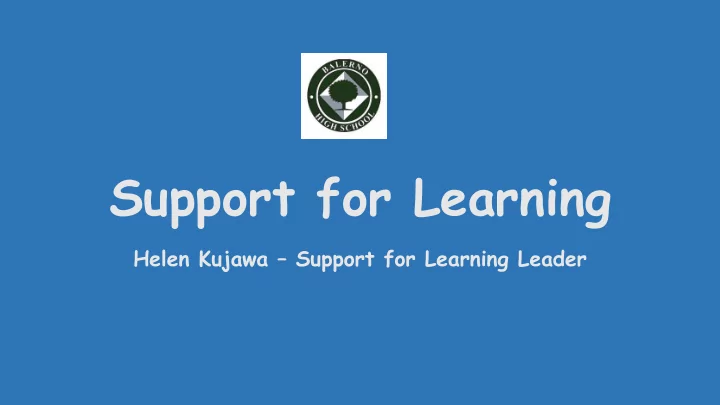

Support for Learning Helen Kujawa – Support for Learning Leader
Legislation Inclusion – presumption to mainstream Support in schools Barriers to learning 5 Roles of Support for Learning Pathways to Support 1,2 and 3
Legislation GIRFEC and Curriculum for Excellence Education (Additional Support for Learning) (Scotland) Act 2009 Reasonable Adjustments CSP Tribunals Education (Scotland) Act 2016 Equality Act (2010) – 9 protected characteristics:
Presumption to Mainstreaming/Inclusion debate https://www.youtube.com/watch?v=YIdUcFnVoFs
Support in schools Universal Support Targeted Support
Barriers to Learning
5 Roles of Support for Learning Teaching - Direct and Cooperative Specialist Services Consultation Staff development Collaborative Working -GIRFEC
Typical tasks may include: Interventions/ Direct teaching eg P7/S1 transition programme, SRA reading intervention, SEAL maths intervention Co-operative Teaching Assessment and monitoring of pupils with Additional Support Needs Creating Support Plans/ strategies, sharing with staff SQA Assessment Arrangements Liaison with Class Teachers / Pupil Support Assistants (PSAs) PSA support/ training – PSA Timetables/ resourcing GIRFEC – Young Person’s Planning Meeting / Paperwork – meeting parents
Pathway 1: In class supports and strategies Strategies to support learning and teaching Pupil Support Assistant allocation Assessment Arrangements SfL Referral process How do staff know about my child? SfL Database Confidential information memos Staff updates on in - service days
CIRCLE Factors which support an inclusive classroom: The Physical Environment The Social Environment The Structures and Routines Motivation
Skills, Supports and Strategies Identify the skill that needs support and select strategies to develop it….. For example, for Attention and Concentration difficulties: • Allow movement breaks • Use visual prompts eg task lists • ‘Chunk’ information • Present learner with short, varied tasks
CIRCLE Inclusive Classroom Scale (CICS)
Literacy and Dyslexia Guidelines
Pathway 2: Needs met within the school
Support Plans
Supporting Literacy Difficulties/Dyslexia ➢ Identify in class strategies (Pathway 1) ➢ If required, provide literacy intervention (Pathway 2): SRA reading intervention Reading for Enjoyment Literacy Strategies group Paired Reading Supporting difficulties with Maths/Numeracy ➢ Identify in class strategies (Pathway 1) ➢ PSA support in lower band classes ➢ Six Minute SEAL programme for S1/S2 (Pathway 2)
Supporting Health and Well Being LIAM programme Nurture Support PEERS/ Emotion Talks 1:1 work for individual pupils
Getting it Right for Every Child Getting it right for every child in Edinburgh threads through all existing policy, practice, strategy and legislation affecting children, young people and families The purpose of GIRFEC in Edinburgh is to support a common coordinated approach across all agencies GIRFEC facilitates the delivery of appropriate, proportionate and timely help to any child or young person, as and when they need it. Getting it right for every child in Edinburgh integrates with the established pathways to support
The GIRFEC Practice Model
Young Person’s Planning Meeting (YPPM) agenda What’s the story? What are the young person’s strengths? What are the key concerns? What are we doing already? Is it working? (scaling) Finding solutions and planning Establishing desired outcomes (goals) Generating actions (solutions) Writing the action plan (What (desired well being outcome)? Who? When?) Next steps Finalising and sharing minute. Agreeing actions. Setting a review date
Pathway 3: Needs met within support from external agencies ASL Services eg Visual Impairment team, Literacy and Dyslexia Support Service, Hospital Outreach team Partner Agencies eg Barnardos, Canongate Youth Allied Health Professionals eg SaLT, OT
Any questions?
Recommend
More recommend